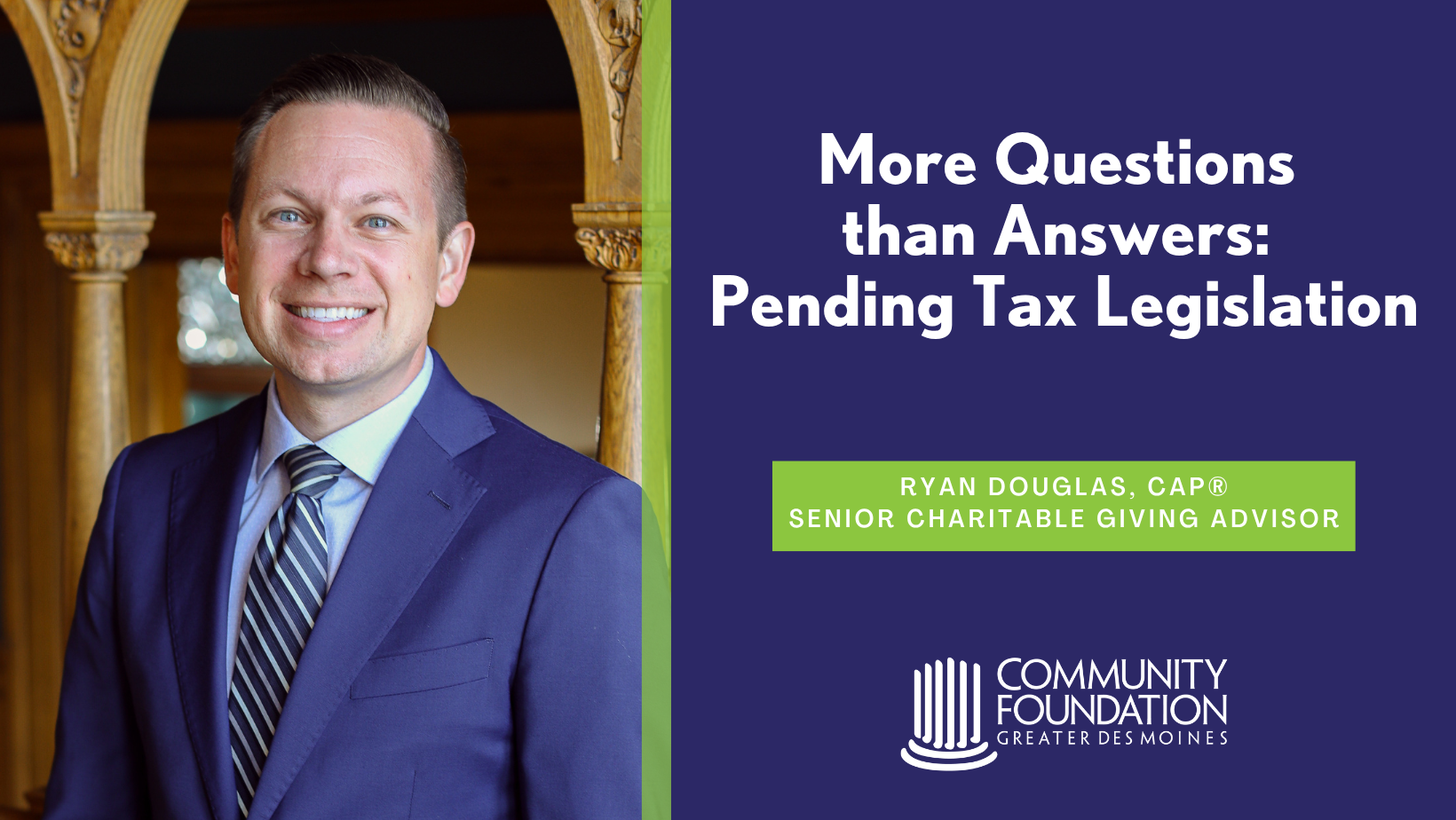More Questions than Answers: Pending Tax Legislation
Jun 5, 2025

Thank you to those of you who have reached out recently with questions about how pending tax legislation might impact the charitable planning strategies you recommend to your clients. The Community Foundation team keeps a close eye on legislative developments related to philanthropy, and we are always here as a sounding board for you and other attorneys, CPAs and financial advisors.
There’s little doubt that you’ve seen extensive news coverage of the "Big Beautiful Bill" (H.R. 1) that passed the House of Representatives by a 215-214 vote on May 22, 2025. On June 16, the Senate Finance Committee released legislative text for its part of the reconciliation package.
While it is impossible to predict how your clients might be impacted by tax law changes, it’s important to be aware of key components of the bill that could impact estate and financial planning. Four key provisions rise to the top as advisors consider how their charitable clients might be affected:
No Sunset of Estate Tax Exemption
The House-passed bill makes permanent the expiring 2017 tax cuts under the Tax Cuts and Jobs Act (TCJA). This means that the much-anticipated sunset of the increased estate tax exemption might not happen at the end of this year after all. If the estate tax exemption remains high, a smaller segment of your clients will be motivated to use charitable giving as a way to avoid estate tax. Still, because people rarely give to charity solely for tax avoidance purposes, your clients remain very interested in discussing charitable giving and incorporating philanthropy into their estate and financial plans.
Standard Deduction Stays High
Proposals in the bill would make permanent the higher standard deduction levels from the TCJA and even add an additional temporary increase through 2028. The upshot here is that few taxpayers itemize their deductions, reducing the number of people eligible to claim a charitable deduction. The still-high standard deduction likely could signal continuation of the decline in charitable giving following the 2017 tax cuts. On the flip side, the bill introduces a modest "above-the-line" charitable deduction for nonitemizers—$150 for individuals and $300 for joint filers.
Increased Taxes on Private Foundations
Proposals in the bill would make permanent the higher standard deduction levels from the TCJA and even add an additional increases moving forward.
- Current law: The TCJA increased the standard deduction and pegged it to inflation. This increase is set to expire at the end of 2025. The standard deduction for 2025 is $15,000 ($30,000 for joint filers).
- What’s in the House-passed version: Section 110002 makes permanent the TCJA increase and temporarily further increases the standard deduction by $1,000 ($2,000 for joint filers). The temporary increase would expire at the end of 2028.
- What’s in the initial Senate Finance Committee text: Section 70102 makes permanent the increased standard deduction from the TCJA and further increases it to $16,000 ($32,000 for joint filers) for 2026, pegged to inflation in future years.
Charitable Deduction for Nonitemizers
- Current law: Taxpayers who do not elect to itemize are not currently eligible for a charitable deduction.
- What’s in the House-passed version: Section 110112 creates a charitable deduction for nonitemizers set at $150 ($300 for joint filers), not including contributions to donor-advised funds. It would sunset at the end of 2028.
- What’s in the initial Senate Finance Committee text: Section 70424 would create a permanent deduction for taxpayers do not itemize, capped at $1,000 ($2,000 for joint filers). This does not include contributions to donor-advised funds.
Increased Taxes on Private Foundations
The bill sharply increases excise taxes on the investment income of large private foundations, raising rates from the current 1.39% to as much as 10% for the largest entities, although private foundations with less than $50 million in assets would see no change.
- Current law: Private foundations (other than exempt operating foundations) are subject to a 1.39% excise tax on net investment income.
- What’s in the House-passed version: The bill sharply increases excise taxes on the investment income of large private foundations, raising rates from the current 1.39% to as much as 10% for the largest entities, although private foundations with less than $50 million in assets would see no change.
- What’s in the initial Senate Finance Committee text: This provision is not included in the Senate Finance Committee's bill.
So what’s next? Both chambers will reconcile differences into July or August before sending the bill to President Trump for signature.
As always, the Community Foundation will keep you posted! Please reach out anytime. Our team is happy to discuss options for your clients’ charitable giving to ensure that they’re supporting their favorite causes and important local needs in the most effective ways possible under any set of tax laws.